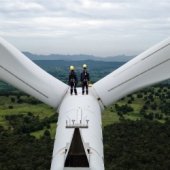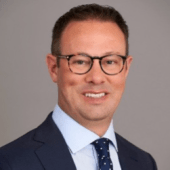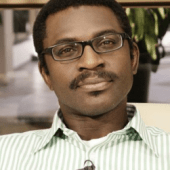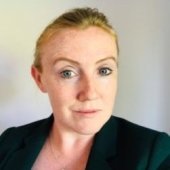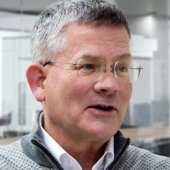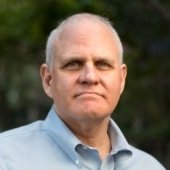IN BRIEF
- 5:00 - In 2024 there’s an Indonesian presidential election and we’re hoping that over the next two years we can raise awareness enough that during one of the debates, during one of the policy positions that the candidates have, air pollution is brought up as something that is important for them as part of their candidacy, and that would be a really big win for the country because up until this point, it hasn’t really been on the radar at all.
- 13:50 - Baseball umpires make more mistakes on days where air pollution is high. The U.S. stock market brokers make worse decisions on days where air pollution is high. There are these things that have to do with our cognitive performance and immediate performance that just haven’t been fully researched yet. Once these come out, it’s going to be, I think, a mad dash for fixing this problem.
- 18:05 - We’re getting to the point now where, in certain departments, folks working there are saying, “Look, this is a big problem. This is not something that we can solve by ourselves and we need to start forming coalitions and we need to start looking at this thing a little bit more creatively than before."
In this VISION by Protiviti podcast, Joe Kornik, Editor-in-Chief of VISION, welcomes Piotr Jakubowski, founder of Nafas, an air-quality company and app built for Jakarta, which has notoriously poor air quality. In fact, it’s some of the worst on the planet, creating significant health risks for the city’s nearly 11 million residents. The Nafas app offers users real time air quality data so they can make intelligent decisions about the air they breathe. In this discussion, Kornik and Jakubowski discuss how the quality and safety of the air—both outdoors and indoors—impact our health, wellness and cognitive performance. In short, better air quality leads to better results. What can business leaders do to make sure their companies are part of the solution, not the problem?
Breath of fresh air: A discussion with the founder of Nafas, an air-quality app in Indonesia - Podcast transcript
Joe Kornik: Welcome to the VISION by Protiviti podcast. I’m Joe Kornik, Director of Brand Publishing and Editor-in-Chief of VISION by Protiviti, a global content initiative looking into the future to examine big themes that will impact the C-suite in executive boardrooms worldwide.
Today, we’re exploring the future of ESG and its strategic implications for people, process, and the planet. Today, I’m excited to welcome Piotr Jakubowski, founder of Nafas, to the podcast. Nafas is a company and an air quality app built for Jakarta, which has notoriously poor air quality. In fact, it’s some of the worst on the planet, creating significant health risks for the 11 million or so residents of the city. When it comes right down to it, the quality and safety of the air we breathe is certainly paramount to our very existence on the planet and Nafas is trying to do something about it. Piotr, thanks so much for joining me today.
Piotr Jakubowski: Thanks so much for having us on board, Joe.
Joe Kornik: Tell us a little bit about Nafas and what it is and how it came to be.<>Piotr Jakubowski: That’s actually a great place to start. I was born and raised in Indonesia and I’ve spent the majority of my life there. As of previously, I was working at a startup, now not a startup anymore, called Go-Jek, and one of the things that had come out of that experience was the fact that mobile technology can be utilized to solve some of the world’s most pressing problems.
After taking a look at environmental problems that were a big thing — plastic waste, energy conversion, water desalination, solar microgrids, electric vehicles — I came across air pollution as being a problem that was affecting us in our own house and got together with a friend of mine from high school who was already doing research in the space and already had a vision to do something about it, and we decided that we would try to build a business around three core principles.
One was making air quality data available for people in Indonesia, not just in Jakarta. The second one was to raise awareness around the health issues associated with air pollution. Then the third one was just really about how can we on a day-to-day basis provide solutions for ourselves and how can we live lives in polluted cities where, whether we like it or not, pollution goes hand-in-hand with globalization, it goes hand-in-hand with rapid development.
It’s a huge problem not just in Indonesia but in a lot of other rapidly developing regions in the world, in South Asia and Central Africa and Central America, South America. So really, what we’re trying to do is make sure that people understand that air pollution is a big problem. At least from the health perspective, we as citizens of these different cities, there are things we can do to protect ourselves that are a lot more manageable than trying to solve the air pollution problem in general, which is a bit of a — for lack of a better term — a Sisyphean task.
Joe Kornik: What is it that you hope Nafas will be able to achieve and why is this so crucial?
Piotr Jakubowski: The challenge with air quality and air pollution is the fact that it’s not something that we generally feel is a big problem because it’s a bit of a “boiling a frog” kind of situation where the temperature goes up a little bit, and here we are 10 to 15 years later, you have these niggling health things that have been building up for years and years and years. What we want to do is we want to make sure that people are aware of this issue, that it is a big problem.
The World Health Organization as recently as October 2021, they revised their guidelines around what is considered safe exposure to air pollution, in particular PM 2.5, particulate matter 2.5, and frankly speaking, a lot of people talk about this as an invisible killer because it’s something that we just generally don’t think about. You think about the food that you’re going to eat and the water that you’re going to drink and you think about some of these other things in life but breathing is automatic. You can’t physically choke yourself to death. Your body will override it yourself, right?
There was this statement that I had read from a — I believe it was an Atlantic article where the writer had written that one of the reasons why air pollution is not a very urgent subject is you just generally can’t imagine anybody dropping dead from air pollution where from some of these other things you can imagine people getting sick and dying from them. So, it is a bit of an uphill battle.
From a Nafas perspective and from an Indonesian region perspective, we’re in 2022 now, 2024 there’s an Indonesian presidential election and we’re hoping that over the next two years we can raise awareness enough that during one of the debates, during one of the policy positions that the candidates have, air pollution is brought up as something that is important for them as part of their candidacy, and that would be a really big win for the country because up until this point, it hasn’t really been on the radar at all. So, in the near future, that’s where we want to get to. We want to get to this level of awareness where people care enough to start demanding it from the regulations in the government that we have, and this is what has happened historically in the UK in the 1950s, the Clean Air Act was passed there. In the US, Reagan in the 70s passed the Clean Air Act. In China as recently as around 10 to 12 years ago, there was a very big push for clean air and a lot of this was pushed from citizens themselves. So, we’re hoping that this type of a — I’m not going to call it a revolution but an evolution happens, and if we can play a role in that, that would be really fantastic. They would chalk up a big W for what we’re doing.
Joe Kornik: Talk to me a little bit more about Nafas and specifically how it works and what you’re doing and why Indonesia. How did you end up in Indonesia and Jakarta specifically when there’s obviously a whole planet to measure up that’s got sub-par quality in some of its bigger cities?
Piotr Jakubowski: I didn’t end up in Indonesia by accident. My parents moved there in the early 80s and my mom was teaching at the International School in Jakarta for almost 40 years actually. So, I was born and brought up in Indonesia and for me it’s home. I went to college in the US and worked a few years in Chicago. As much as I liked watching baseball and just enjoying life in a big city, there was just something about the emerging markets that really pulled me back.
The key part of why we had decided to build things was out of a bit of a frustration because air quality was bad in Jakarta at the time where we started putting things together. It wasn’t really a secret. For me honestly, it was really this personal situation where out of my own curiosity I started measuring air quality in the areas that I was spending a lot of time in. My wife and I, we had chosen a house that we were living in in Jakarta. We rented a house that had a very big garden because we were under the impression that this big garden and all these trees and greenery and this lushness was going to protect us from this pollution. What I did was I ended up borrowing an air quality monitor and putting it in my garden and the readings very consistently came up about 30% worse than the Central Business District. That was like, “How is this even possible?” I call that — if you’ve ever read Alice in Wonderland — I call that the “opening to the rabbit hole” into this wonderland of air quality. That’s what it started out with. It started out with the frustration that there’s no data available that there’s a lot of misinformation — not really misinformation but more misconception going on.
Number one was the one that I experienced. “Hey, if you live in a green space, you don’t have to worry about air pollution because all the trees are going to make things really good for you.” It’s a misconception. The second one is that air quality is best in the morning. In Jakarta, based on the data that we have, it’s not. It’s actually the worst in the morning, which is a little bit counterintuitive. So, this data existing and what we did was we installed a network of outdoor air quality monitors. Before Nafas, there were three or four government stations in the city. We’re installing low-cost sensors which allow us to scale really fast. In the greater Jakarta area, we’ve got over 120, and then in the overall Indonesian network, there’s a 160. This data comes in to the app, and for people who are learning about air quality or concerned about air quality, real-time data is available for free whenever you want. We’ve incorporated things like alerts. There’s running alerts if you’re an athlete. There’s a special alert that you can put together that just tells you like, “Hey, it’s not a good time to go out for a run right now.”
In the future, we see this as a way to guide people’s lifestyles whether we like it or not. I mentioned it before, the air pollution outside isn’t really going to change, and the types of things that would make that change happen are just extremely difficult to manage especially in an emerging market. I’d consider myself a bit of a climate realist. At some point, a lot of these emerging markets they have to decide between, “Do we want fast development or do we want to save the environment?” At the end of the day, a lot of the choices are made toward the first one unfortunately. That’s where we’re building for the future. We want to build an experience that takes into consideration, “Look, we’re going to be polluted. We’re going to be polluted for a while whether that’s 10, 15, 30, 50, a hundred years, we don’t know but just because we have this pollution outside doesn’t mean that people have to live unhealthy lifestyles, and that’s the vision for the ecosystem that we’re building.
One of the things that we discovered over the past few months of collecting indoor and outdoor data is that in tropical countries in particular, the leakage of outdoor air pollution inside is almost 100%. So, on these days where you see India or in Indonesia where PM 2.5 levels are 10 times, 20 times, 30 times above the World Health Organization guideline, there’s an extremely high likelihood that’s exactly the same indoors. We’ve taken that into consideration, and one of the things that we’ve been building out are indoor monitoring and indoor filtration solutions. An indoor air quality monitor is super simple. It just lets you know what your pollution is like inside, what your temperature, humidity, and CO2 levels are as well. Then an air purifier, there’s not much rocket science around the fact that HEPA filters are the global standard for removal of air pollution indoors. We work with scientists from various universities. We work with scientists who have done research for Boeing and for other large companies like that.
Basically, the way that we see it is indoor air quality and clean indoor air quality is something that’s going to be very, very important in the future so we’ve built the infrastructure to be able to automate it, to be able to start forecasting what these indoor conditions are going to be like. Then for people like you and I, we’re looking at building a sonos for air quality where you’ve got an ecosystem that is completely fully-automated. You don’t have to think about it when you walk in to your home or when you walk into your office or when you walk into a business. That’s called a “clean air zone” which we are implementing. You know that air quality in there is going to be great and you have nothing to worry about. One of the things that we’ve gotten used to over the last few years is the seamlessness of these experiences. We do you think that clean air is an experience and it’s something that the less you have to think about it in order to maintain it at a level that’s healthy, the better it is for everybody. Indoor air quality is an extremely important part of how we look at the problem in the future, and up until today, we’ve already built, launched, and started selling solutions that are designed for emerging markets, and our first market is Indonesia.
Joe Kornik: Yes, that’s interesting. I have to admit, I knew we were talking about air quality. I was thinking outside air quality, right? Obviously, we spend most of our times indoors. [Laughter] That’s really what we’re breathing more than anything. It’s such an interesting point and something for me to keep in mind.
Piotr Jakubowski: The interesting thing about that is over the last few years at Harvard University, an organization popped up called the Healthy Buildings Institute, and they combine environmental engineering with architecture. It’s amazing the type of research that’s coming out. I think that over the next four or five years, there’s going to be more and more research that comes out around the short term and acute impacts of air pollution that are really going to change people’s minds about what it’s like. A super interesting study that we still reference today, chess players make more mistakes and lose more games on days when air pollution are high. Baseball umpires make more mistakes on days where air pollution is high. The US stock market brokers make worse decisions on days where air pollution is high. There are these things that have to do with our cognitive performance and immediate performance that just haven’t been fully researched yet. Once these come out, it’s going to be, I think, a mad dash for fixing this problem.
Joe Kornik: Fascinating. When you think about the environment that you’re working in, in an office building for instance, and if you could measure the air quality of Company A versus Company B and map that, chart that against performance or innovation or whatnot, what an interesting way of looking at it that I had never thought of.
Piotr Jakubowski: I’ll send you a study and maybe you want to make it available to the listeners as well from this Harvard Business School Healthy Buildings Institute. They studied exactly that. They saw that at a PM 2.5 level above 12, there started being very noticeable differences in cognition and very noticeable difference in performance. Out of five cognitive tests, people who took these tests in the worst air pollution levels performed worse on four of them. This is the interesting sector that we’re talking about. That’s what’s getting me excited to work with different universities is bringing this information and bringing this data to light.
Joe Kornik: It sounds like it’s about arming the end-user essentially, the resident of the city with more information, more data than they probably had in the past. Not so much essentially giving them tools to help fix the problem or giving them tools to perhaps start to work within the system to figure out ways to make the air quality better. It sounds like it’s more just about managing a problem that you think will exist for a long time. How would you define success, I guess, with Nafas in Indonesia?
Piotr Jakubowski: I think success ideally would be for us not to need to exist. Over the next 40 or 50 years, if we do take some of these climate targets seriously, I think there is an opportunity for us not to exist, but it would be extremely, extremely hard.
You brought up a great point about what we can do as individuals. I think from a climate perspective we’re at the point now where Earth Day and turn your lights off and stop running your water and things like that, they’re just not enough, and a lot more needs to be done particularly in these public-private relationships to make a lot of this infrastructure available especially in emerging markets. I’ll just give a very, very quick example. I would love to get an electric vehicle in a place like Jakarta, but an electric vehicle costs eight times as much as a regular car. Plus, there is no charging infrastructure. So, how are we going to transition if that infrastructure is not available? There’s a bit of a chicken-and-egg problem here, and I think that that’s where — I’m sure you’ve seen this in the US as well in the ESG space, in the climate space, in the sustainability space, there’s more companies being created, there’s more research done into super frontier industries that you see this and you’re like, “Holy moly, what is this?” The amazing thing as well is that there’s a lot more investment happening in that space. So, it is a very, very exciting time. On top of all these other anxieties that we have, COVID anxiety, war anxiety and now climate anxiety, it is a very, very exciting place to be.
Joe Kornik: You’ve mentioned the public-private partnership and I did want to talk about that. How have you found working with the city of Jakarta or the government of Indonesia? Are you working with them? Have they been cooperative? Have they been open to this new technology and are there ways forward in the future for Nafas or others to work with public enterprises to solve some of these problems or help solve some of these problems?
Piotr Jakubowski: It’s definitely been an interesting time, because for a very long time, before a lot of these new industries and new startups started to pop up, there was an expectation that the government was going to solve everything. Where we’re getting to the point now is, in certain departments, folks working there are going the other way now where they’re saying, “Look, this is a big problem. This is not something that we can solve by ourselves and we need to start forming coalitions and we need to start looking at this thing a little bit more creatively than before.” If you take a look at the Jakarta government, the current governor Anies Baswedan, he is a president of the C40 cities initiative. It’s a coalition of 40 cities around the world and the mayors of 40 cities around the world to talk about how to build better cities for the future. There is a lot of progress we have been working together with different departments, but it is a little bit of a work in progress simply because there’s a new way of doing things. As you guys at Protiviti are very well aware of this, sometimes there’s a certain trepidation with new things, and it takes a little bit of time for everybody to feel the flow. We’re definitely getting there. I think the good news is that there are a lot of collaboration opportunities, and as long as we’re actively thinking about solutions and no longer ignoring the problem as if it would magically be going away any time soon, I think that’s generally a plus.
Joe Kornik: Right. Do you think the solutions lie in the regulatory and governance realm? Do you think that having compliance be one of the drivers will affect change, or do you think this will be more organic and will bubble up from residents demanding better air quality?
Piotr Jakubowski: It’s going to have to come from both. It’s a bit of a tug-of-war unfortunately, because air quality is a multi-departmental government problem, because it’s a Ministry of Energy problem, it’s a Ministry of Transport problem, it’s a Ministry of Fisheries problem, and Industry. It’s one of the most difficult ones to solve out there because it just manifests itself in a variety of different forms. If there’s anything that we can learn from China, I think the government of China has been taking very clear steps to reduce pollution and it’s coming in from compliance. I think that’s one of the ways that China works is, they put a law in place or they put a rule in place and that’s it. There’s no other way around it. There is definitely a lot of compliance that is needed on a variety of those different sectors, and that’s where the other side of the coin comes in. The more people are aware about this people, the more people for whom it is a problem, the higher it will rise to the list of priorities for the government, members of parliament, and the different ministries.
The best example of this I would say is from the UK. You cannot run for government; you cannot run for town council or mayor or whatever position within the government in the UK in whatever city that you are without a position on air pollution because people are so well informed and people care so much that they demand it from you. We do have two years until the next election but in the next two election cycles, we can get to the point where it is something that is actively being resolved.
To answer the question, it’s definitely a bit of push-and-pull, I think, not just from a government perspective but from a private sector perspective if you take a look at how some of the world’s largest corporations have behaved over the last 10 years. If there’s no compliance, if there’s no one slapping people on the wrist, then there is a lot of different things going on behind the scenes that are shareholder-first versus environment-first, and that’s where that compliance part comes in.
Joe Kornik: Sure. Any predictions about where we’ll be in 2035 just in general regarding air quality in some of the largest cities? How optimistic are you about the future, about us potentially fixing a problem that we’re probably becoming more and more aware of?
Piotr Jakubowski: Am I optimistic? [Laughter] That’s a great question. I do think that from an indoor perspective, if we get things right then we can make sure that our indoor world — just like in most emerging markets, you see a certain ubiquity around air conditioning. I think that there’s going to be a ubiquity around clean air indoors, and that will be the victory when it comes to air quality. In terms of what’s going on outdoors, it’s a bit of Russian Roulette unfortunately. Every year we have COP25, COP26. This year there’s going to be COP27. We just had Davos where 1,500 private jets showed up to talk about climate. It’s hard to be optimistic when a lot of these conversations are simply conversations and that action’s not taking place. Is there anybody to blame for that? I actually don’t think so because at the end of the day, every single country and every single business has their own interests and has things that they want to build out. That’s why we’re optimistic around indoor. It’s something that we can control. You and I have full control over it. We don’t have to picket around a factory or try to push an idea or a mindset onto anybody else. By 2035, I really do think that, from an indoor perspective, we’ll get things right, and hopefully we’re not going to be living in biodomes on this planet. There’s been renderings of what biodomes would look like on Mars, right? It would be a real shame to see that here.
Joe Kornik: Thank you so much for joining us on the program today.
Piotr Jakubowski: Thanks for having Nafas on the show, Joe, and if you’re ever in Indonesia, go ahead and download the app.
Joe Kornik: I absolutely will. Thanks so much for your time today. Thanks again for listening to the VISION by Protiviti podcast. Please subscribe to join VISION by Protiviti to sharpen your vision and make sure your business stays future-ready. We’ll see you next time.
Piotr Jakubowski is the Founder & Chief Growth Officer at Nafas, the air-quality app built For Jakarta so people can be aware of the air they breathe, and the impact that the quality of air has on their health and their life. He has been tasked with bringing marketing excellence and innovation to the GO-JEK family of products and services. Piotr manages the in-house marketing team across creative, social, media buying, public relations, digital and above the line activities. He also sits on the management board, bringing consumer insights and communications innovation to the GO-JEK family of products and services.
Did you enjoy this content? For more like this, subscribe to the VISION by Protiviti newsletter.




